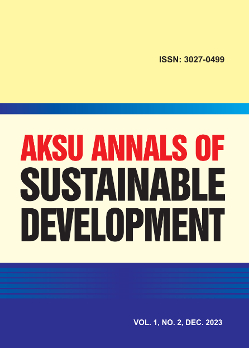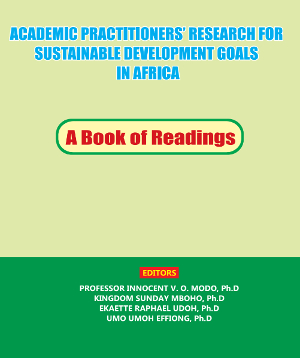ENTREPRENEURSHIP EDUCATION AND ACQUISITION OF EMPLOYABILITY SKILLS AMONG BUSINESS ADMINISTRATION STUDENTS OF UNIVERSITY OF UYO
DOI:
https://doi.org/10.60787/AASD-v1i2-25Keywords:
Entrepreneurship, education sector, employability skills, development, University of UyoAbstract
Throughout the world, entrepreneurship education remains the bedrock for acquiring employable skills by graduates for employment upon graduation. Unfortunately, many countries face economic challenges and immense pressure on higher education to produce quality graduates who can turn around economies with their specialist knowledge and skills. The study examines how entrepreneurship education enhances employability skills acquisition among undergraduate students in Nigeria, with the view to equipping them with employable skills for uphill tasks upon graduation using the University of Uyo as a case study. Five objectives, research questions and hypotheses formulated to guide the study were tested using the mean score and chi-square statistical methods respectively. Political Economy theoretical approach with a survey-based descriptive research design was adopted for the study. The population was drawn from 200 level students of 2019/2020 sessions in the Faculty of Business Administration at the University of Uyo with a sample size of 475 using a simple random sampling technique to select a sample for the study. The instrument for data collection was a structured questionnaire titled “Students’ Employability Skills Acquisition Scale (SESAS). The validity of the instrument was determined by two experts and the reliability coefficient range was 0.7- 0.78. The null hypotheses were tested using the chi-square statistical method and all were rejected and the alternate hypotheses were retained. The findings revealed that entrepreneurship education influences the acquisition of employability skills of students at the University of Uyo, Nigeria. The study recommended among others that government should provide the needed equipment and facilities to make the teaching of entrepreneurship education practically oriented in all universities across the country.
Downloads
References
Abogoh, L. O., Asangausung, O. S., Frank, N. G. and Sunday, J. R. (2022).Entrepreneurial studies and its relevance in the University of Uyo, Akwa Ibom State, Nigeria (pp. 105-117). In: C. J. Ukwu,
D. O. Nwaokugha, J. A. Onyido, & H. A. Agbarakwe. Repositioning Education and Society for Relevance in the 21st Century Nigeria.Gen-X Press Limited, Diobu, Rivers State, 266p.
Adidu, F. A. and Olannye, A. P. (2006).Basic small business entrepreneurship: a modern approach. Royal Pace Publications, Agbor,Nigeria.
Agha E., Ukommi A., Ekpenyong O.and Effiong, U.(2020). Establishing the nexus between technical education and industrial development in Nigeria. Journal of Research in Education and Society,11(1),38-56.
Agu, R.A., Chiaha, G.T. U. and Ikeme, A.I. (2013).A paradigm shift in entrepreneurship education pedagogy in Nigeria: issues that must be confronted to evolve best practice. Paper presented at entrepreneurship seminar at University of Mkar, Mkar.
Akanmu, O. (2011). Graduate employment and employability challenges in Nigeria. Proceedings of the British Council Global Higher Education Conference, Hong Kong, 12 March 2011.
Akpan, C. and Effiong, U.(2021). Communication and social inclusion advocacy for persons with disabilities in Akwa Ibom State, Nigeria. International Journal of African Language and Media Studies, 1(1), 60-75.
Akpan, C. andEtor, C. (2013).University lecturers’ perception of entrepreneurship education as an empowerment strategy for graduate self- employment in south- south Nigeria.International Journal of Asian Social Science, 3, (5), 1180-1195.
Akpotohwo, F., Seidougha, P. andOgeibiri, C. (2016). Assessment of entrepreneurial skill needs of business education students for self-sustainability in Bayelsa State, Nigeria. Teacher Education and Curriculum Studies, 1(2), 28-32.
Akyol, A. (2012). Reading difficulty and its remediation: a case Study.European Journal of Educational Research, 8(4), 1269-1286.
Avlijaš, G., Avlijaš, R., Heleta, M. (2014).Financial literacy as a factor in reducing entrepreneurial risk. Paper presented at FINIZ 2014 - The Role of Financial Reporting in Corporate Governance. doi: 0.15308/finiz-2014-112-114
Dania, J., Bakar, A. and Mohamed, S. (2014). Factors influencing the acquisition of employability skills by students of selected technical secondary school in Malaysia. International Education Studies, 7, 117-124.
Effiong, U.andEkpenyong, O.(2017). Effect of community based rehabilitation services and livelihood enhancement among people with disabilities in Akwa Ibom State, Nigeria. InternationalJournal of Economic Development Research and Investment, 8(1), 15-30.
Ejere, E. S. I. andTende, S. B. A. (2012).Entrepreneurship and new venture creation. In E. Chuta (Ed.).Small enterprises and entrepreneurship development. Dakar: Amalion Publishing.
Ekpo, O. J. (2016). Entrepreneurship education: a paradigm for sustainable development in Nigeria. A Paper presented at 1st National Conference with the theme: Harnessing Resources for National Development in Nigeria at College of Art and Science, NnungUkum, Ikono, Akwa Ibom State.
Ekwue, K., Udemba, N. and Ojuro, C.(2019).Strategies for improving employability skills acquisition of business education students. Nigerian Journal of Business Education (NIGJBED), 6(1), 94-106.
Ewumi, A. M., Oyenuga, A. O. and Owoyele, J. W. (2012). Entrepreneurship education as panacea for youth unemployment: implication of vocational counseling for sustainable national development. Journal of Education and Practice, 3 (14), 73-77
Garcia, J. S. C. and Sanchez, B. H.(2023). Psychological capital and entrepreneurship: a systematic literature review of a growing research agenda. Aldizakaria, 19(2),276-295.
Garwe, E. (2013). Quality assurance challenges and opportunities faced by private Universities in Zimbabwe. Journal of Case Studies in Education, 1-16.
Imeokparia, P. O. and Kennedy, E. (2021). Reward Systems as Determinants of Business Educators’ Perceived Job Performance and Retention in Colleges of Education in Niger Delta, Nigeria. International Journal of Educational Research and Policy Making (IJERPM), 4(1), 722-730.
Jiddah, S. A. (2016). Effect of entrepreneurship education on graduates’ business start-up in north central Nigeria.European Journal of Business and Management, 8(20), 48-60.
Kim, A.J. and Ko, E. (2012) Do social media marketing activities enhance customer equity? an empirical study of luxury fashion brand.Journal of Business Research, 65, 1480-1486.
McAuthur, E., Kubacki, K., Pang, B. and Alcaraz, C. (2019). The employers’ view of “work-ready” graduates: a study of advertisements for marketing jobs in Australia. Journal of Marketing Education, 39(2), 82-93
Mustapha, M. andMaitilee, S. (2015). Personal attributes, family influences, entrepreneurship education and entrepreneurship inclination among university students, Kajian Malaysia, 33(1), 155–172.
Ndlovu, W., Munyeka, W. and DimphoMashile, D.(2019).Organisational culture and turnover intentions among academics: a case of a rural-based university. Studies in Higher Education, 46(8), 385-39.
Ngerem, E. I. andEzikpe, N. (2016). Role of entrepreneurship education in secondary schoolstudents economic development. International Journal of Education and Evaluation, 2(3), 36-42.
Nwosu, J. C. and Chukwudi, J. H. (2018).Entrepreneurship education and the challenges of graduate employability in Nigeria.International Journal of Innovation Management, 9(5), 189-193
Oboreh, J. andNnebe, E. (2019).Entrepreneurship education and skill acquisition of graduates in public universitiesin South-East, Nigeria. International Journal of Business & Law Research, 7(4), 84-97.
Oliver, B. (2013). Graduate attributes as a focus for institution-wide curriculum renewal: innovations and challenges. Higher Education Research & Development, Routledge, 450-463.
Olomola, B. and Shodipe, O. (2017). Nigeria beyond job scarcity: the role of technical and vocational education and training (TVET). Journal of Economic Development Research and Investment, 8(1).
Onuma, N. (2016).Entrepreneurship education in Nigerian tertiary institutions: a remedy to graduates unemployment. British Journal of Education, 4(5), 16-28.
Olorundare, A. S. and Kayode, D. J. (2014). Entrepreneurship education in Nigerian universities: a tool for national transformation. Asia Pacific Journal of Educators and Education, 29, 155–175.
Oosterbeek, H., van liraag, M. and Ijsselstein, A. (2010).The impact entrepreneurship education on entrepreneurship skills and motivation.European Economic Review, 54(3), 442-454. DOI: 10.1016/j.euroecorev.2009.08.002
Oviawe, J. I. (2010). Repositioning Nigerian youths for economic empowerment through entrepreneurship education.European Journal of Educational Studies, 2(2), 113–118.
Sofoluwe, A., Shokunbi, M., Raimi, L. andAjewole, T. (2013). Entrepreneurship education as a strategy for boosting human capital development and employability in Nigeria: issues, prospects, challenges and solutions. Journal of Business Administration and Education, 3(1), 25-50.
Sodipo, O. O. (2014). Employability of tertiary education graduates in Nigeria: closing the skills-gap. Global Journal of Human Resource Management, 2(3), 28-36.
Sucuahi, W. (2013).Determinants of financial literacy of micro-entrepreneurs in Davao City.International Journal of Accounting Research, 42(826), 1-8. The History of University of Uyo: A Citadel of Learning (https://uniuyo.edu.ng/history/).
Umoh, E. U. (2022). Entrepreneurship education and acquisition of employability skills among business administration students of University of Uyo, Akwa Ibom State, Nigeria. An Unpublished BSc Project in Institute of Education and Professional Development, University of Uyo, Uyo, Nigeria.
Undiyaundeye, F. and Otu, E. (2015).Entrepreneurship skills acquisition and the benefits amongst the undergraduate students in Nigeria. European Journal of Social Sciences Education and Research, 5(1), 357-362.
Downloads
Published
Issue
Section
License
Copyright (c) 2024 AKSU Annals of Sustainable Development

This work is licensed under a Creative Commons Attribution-NonCommercial-NoDerivatives 4.0 International License.
Manuscript content on this site is licensed under Creative Commons Licenses. Authors wishing to include figures, tables, or text passages that have already been published elsewhere are required to obtain permission from the copyright owner(s) for both the print and online format and to include evidence that such permission has been granted when submitting their papers. Any material received without such evidence will be assumed to originate from the authors.





 ICIDR Publishing House
ICIDR Publishing House